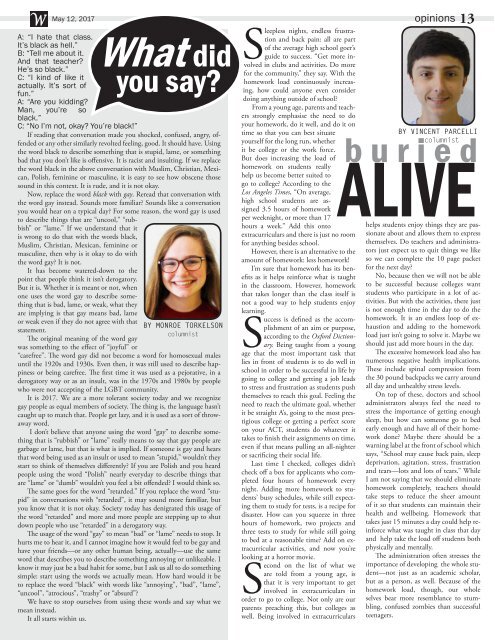Create successful ePaper yourself
Turn your PDF publications into a flip-book with our unique Google optimized e-Paper software.
W <strong>May</strong> 12, <strong>2017</strong> opinions 13<br />
A: “I hate that class.<br />
It’s black as hell.”<br />
B: “Tell me about it.<br />
And that teacher?<br />
He’s so black.”<br />
C: “I kind of like it<br />
actually. It’s sort of<br />
fun.”<br />
A: “Are you kidding?<br />
Man, you’re so<br />
black.”<br />
C: “No I’m not, okay? You’re black!”<br />
If reading that conversation made you shocked, confused, angry, offended<br />
or any other similarly revolted feeling, good. It should have. Using<br />
the word black to describe something that is stupid, lame, or something<br />
bad that you don’t like is offensive. It is racist and insulting. If we replace<br />
the word black in the above conversation with Muslim, Christian, Mexican,<br />
Polish, feminine or masculine, it is easy to see how obscene those<br />
sound in this context. It is rude, and it is not okay.<br />
Now, replace the word black with gay. Reread that conversation with<br />
the word gay instead. Sounds more familiar? Sounds like a conversation<br />
you would hear on a typical day? For some reason, the word gay is used<br />
to describe things that are “uncool,” “rubbish”<br />
or “lame.” If we understand that it<br />
is wrong to do that with the words black,<br />
Muslim, Christian, Mexican, feminine or<br />
masculine, then why is it okay to do with<br />
the word gay? It is not.<br />
It has become watered-down to the<br />
point that people think it isn’t derogatory.<br />
But it is. Whether it is meant or not, when<br />
one uses the word gay to describe something<br />
that is bad, lame, or weak, what they<br />
are implying is that gay means bad, lame<br />
or weak even if they do not agree with that<br />
statement.<br />
The original meaning of the word gay<br />
was something to the effect of “joyful” or<br />
What did<br />
you say?<br />
BY MONROE TORKELSON<br />
columnist<br />
“carefree”. The word gay did not become a word for homosexual males<br />
until the 1920s and 1930s. Even then, it was still used to describe happiness<br />
or being carefree. The first time it was used as a pejorative, in a<br />
derogatory way or as an insult, was in the 1970s and 1980s by people<br />
who were not accepting of the LGBT community.<br />
It is <strong>2017</strong>. We are a more tolerant society today and we recognize<br />
gay people as equal members of society. The thing is, the language hasn’t<br />
caught up to match that. People get lazy, and it is used as a sort of throwaway<br />
word.<br />
I don’t believe that anyone using the word “gay” to describe something<br />
that is “rubbish” or “lame” really means to say that gay people are<br />
garbage or lame, but that is what is implied. If someone is gay and hears<br />
that word being used as an insult or used to mean “stupid,” wouldn’t they<br />
start to think of themselves differently? If you are Polish and you heard<br />
people using the word “Polish” nearly everyday to describe things that<br />
are “lame” or “dumb” wouldn’t you feel a bit offended? I would think so.<br />
The same goes for the word “retarded.” If you replace the word “stupid”<br />
in conversations with “retarded”, it may sound more familiar, but<br />
you know that it is not okay. Society today has denigrated this usage of<br />
the word “retarded” and more and more people are stepping up to shut<br />
down people who use “retarded” in a derogatory way.<br />
The usage of the word “gay” to mean “bad” or “lame” needs to stop. It<br />
hurts me to hear it, and I cannot imagine how it would feel to be gay and<br />
have your friends—or any other human being, actually—use the same<br />
word that describes you to describe something annoying or unlikeable. I<br />
know it may just be a bad habit for some, but I ask us all to do something<br />
simple: start using the words we actually mean. How hard would it be<br />
to replace the word “black” with words like “annoying”, “bad”, “lame”,<br />
“uncool”, “atrocious”, “trashy” or “absurd”?<br />
We have to stop ourselves from using these words and say what we<br />
mean instead.<br />
It all starts within us.<br />
Sleepless nights, endless frustration<br />
and back pain: all are part<br />
of the average high school goer’s<br />
guide to success. “Get more involved<br />
in clubs and activities. Do more<br />
for the community,” they say. With the<br />
homework load continuously increasing,<br />
how could anyone even consider<br />
doing anything outside of school?<br />
From a young age, parents and teachers<br />
strongly emphasise the need to do<br />
your homework, do it well, and do it on<br />
time so that you can best situate<br />
yourself for the long run, whether<br />
it be college or the work force.<br />
But does increasing the load of<br />
homework on students really<br />
help us become better suited to<br />
go to college? According to the<br />
Los Angeles Times, “On average,<br />
high school students are assigned<br />
3.5 hours of homework<br />
per weeknight, or more than 17<br />
hours a week.” Add this onto<br />
extracurriculars and there is just no room<br />
for anything besides school.<br />
However, there is an alternative to the<br />
amount of homework: less homework!<br />
I’m sure that homework has its benefits<br />
as it helps reinforce what is taught<br />
in the classroom. However, homework<br />
that takes longer than the class itself is<br />
not a good way to help students enjoy<br />
learning.<br />
Success is defined as the accomplishment<br />
of an aim or purpose,<br />
according to the Oxford Dictionary.<br />
Being taught from a young<br />
age that the most important task that<br />
lies in front of students is to do well in<br />
school in order to be successful in life by<br />
going to college and getting a job leads<br />
to stress and frustration as students push<br />
themselves to reach this goal. Feeling the<br />
need to reach the ultimate goal, whether<br />
it be straight A’s, going to the most prestigious<br />
college or getting a perfect score<br />
on your ACT, students do whatever it<br />
takes to finish their assignments on time,<br />
even if that means pulling an all-nighter<br />
or sacrificing their social life.<br />
Last time I checked, colleges didn’t<br />
check off a box for applicants who completed<br />
four hours of homework every<br />
night. Adding more homework to students’<br />
busy schedules, while still expecting<br />
them to study for tests, is a recipe for<br />
disaster. How can you squeeze in three<br />
hours of homework, two projects and<br />
three tests to study for while still going<br />
to bed at a reasonable time? Add on extracurricular<br />
activities, and now you’re<br />
looking at a horror movie.<br />
Second on the list of what we<br />
are told from a young age, is<br />
that it is very important to get<br />
involved in extracurriculars in<br />
order to go to college. Not only are our<br />
parents preaching this, but colleges as<br />
well. Being involved in extracurriculars<br />
BY VINCENT PARCELLI<br />
buried<br />
columnist<br />
ALIVE<br />
helps students enjoy things they are passionate<br />
about and allows them to express<br />
themselves. Do teachers and administrators<br />
just expect us to quit things we like<br />
so we can complete the 10 page packet<br />
for the next day?<br />
No, because then we will not be able<br />
to be successful because colleges want<br />
students who participate in a lot of activities.<br />
But with the activities, there just<br />
is not enough time in the day to do the<br />
homework. It is an endless loop of exhaustion<br />
and adding to the homework<br />
load just isn’t going to solve it. <strong>May</strong>be we<br />
should just add more hours in the day.<br />
The excessive homework load also has<br />
numerous negative health implications.<br />
These include spinal compression from<br />
the 30 pound backpacks we carry around<br />
all day and unhealthy stress levels.<br />
On top of these, doctors and school<br />
administrators always feel the need to<br />
stress the importance of getting enough<br />
sleep, but how can someone go to bed<br />
early enough and have all of their homework<br />
done? <strong>May</strong>be there should be a<br />
warning label at the front of school which<br />
says, “School may cause back pain, sleep<br />
deprivation, agitation, stress, frustration<br />
and tears—lots and lots of tears.” While<br />
I am not saying that we should eliminate<br />
homework completely, teachers should<br />
take steps to reduce the sheer amount<br />
of it so that students can maintain their<br />
health and wellbeing. Homework that<br />
takes just 15 minutes a day could help reinforce<br />
what was taught in class that day<br />
and help take the load off students both<br />
physically and mentally.<br />
The administration often stresses the<br />
importance of developing the whole student—not<br />
just as an academic scholar,<br />
but as a person, as well. Because of the<br />
homework load, though, our whole<br />
selves bear more resemblance to stumbling,<br />
confused zombies than successful<br />
teenagers.


















